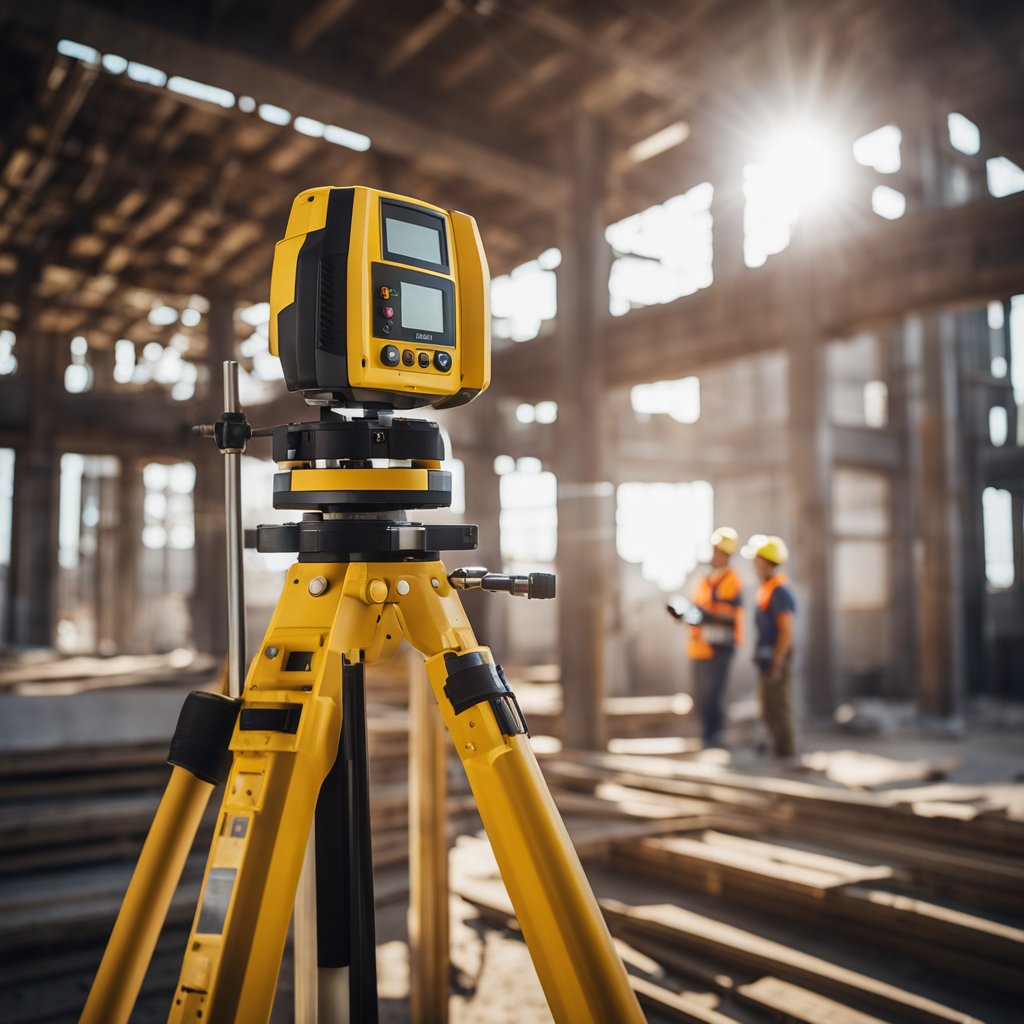Laser levels are essential tools in construction for achieving precise measurements and aligning structures. These devices use lasers to project a straight line or level with a wide field of view. Walls, cabinets, and flooring, among other projects, rely on this precision to be correctly installed. Technological advancements have made laser levels more user-friendly and versatile, making them suitable for professionals and DIY enthusiasts.
Before choosing a laser level, it is vital to evaluate several essential aspects thoroughly. The type of laser, such as red or green, affects visibility. Green lasers are generally easier to see in bright lighting but can be more expensive. Range is another crucial aspect, as some levels work well indoors while others work best when used in the fresh air. Self-leveling, battery life, and durability can significantly impact the tool’s performance and suitability for specific tasks.
For instance, a green laser with a long-range and durable construction might be the best choice if you’re working on a large outdoor project. On the other hand, for indoor tasks that require high precision, a red laser with a self-leveling feature and a long battery life could be more suitable.
We explored different models to find the best laser levels for construction that balance quality and functionality. Each option stands out in its capability to help builders and homeowners achieve precise results on their projects. Click here for further information on our site, Ice Age Tools.
Best Laser Levels For Construction
Having the right tools is essential when working on construction projects. We have researched and compiled a list of the best laser levels available to help you achieve precise and accurate results. Each product offers unique features to meet different needs on the job site. To help you make a more informed decision, we’ve created a comparison table highlighting each laser level’s essential features, such as type of laser, range, self-leveling capability, battery life, and durability.
ASOBRIS 360° Laser Level
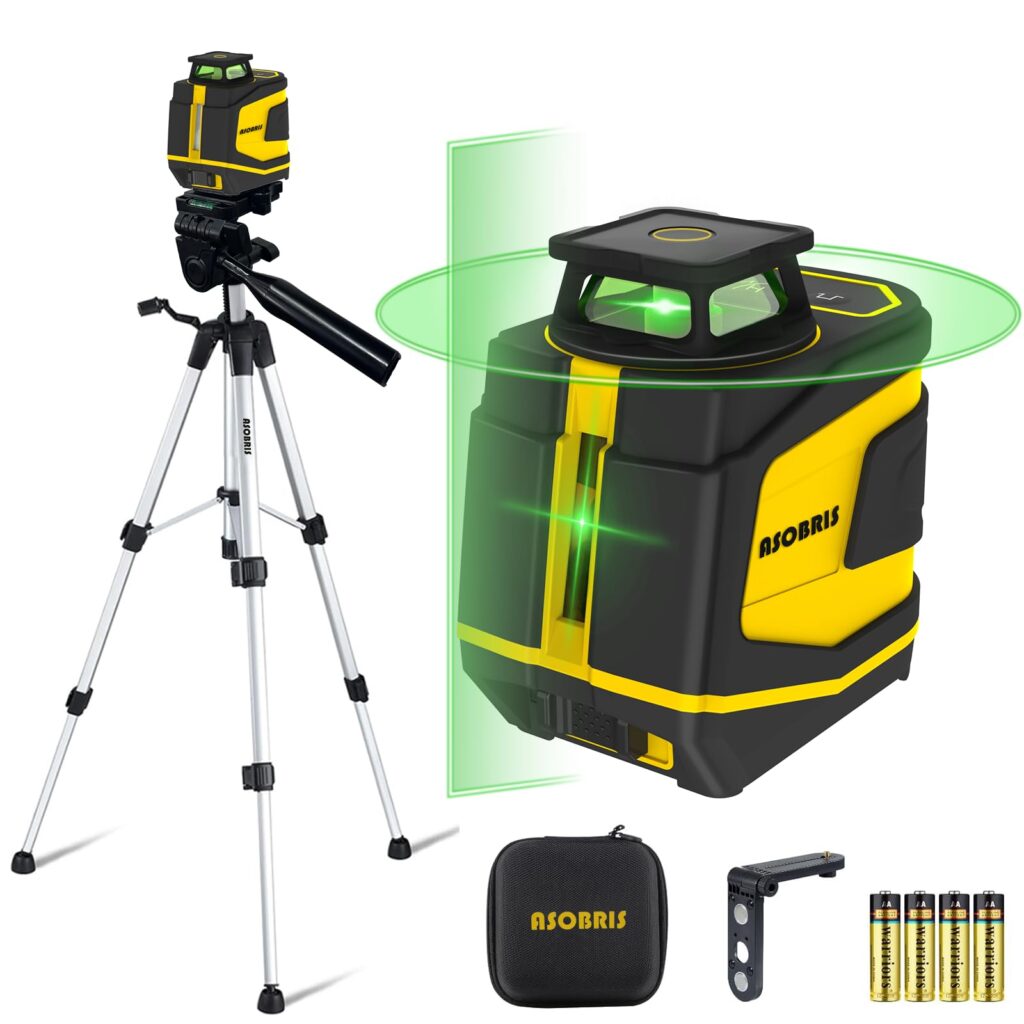
We believe the ASOBRIS 360° Laser Level is a solid choice for anyone tackling construction or DIY projects.
Pros
- Completely safeguards a variety of applications.
- The self-leveling feature saves time during setup.
- It is easy to move due to its compact form.
Cons
- The battery life could be better.
- The tripod may feel flimsy.
- Limited range for vast areas.
Using the ASOBRIS 360° Laser Level has been a positive experience. The 360° cross-line feature offers comprehensive coverage, whether hanging pictures or aligning tiles. It’s lightweight but sturdy, making it straightforward to carry around the job site.
In addition, the self-leveling capability is a game-changer. We no longer spend extra time making adjustments. It quickly adjusts to any surface within ±3°, giving us confidence in our precision. The brightness adjustments help in different lighting situations, ensuring we can see the laser lines.
Including a tripod is a nice touch, allowing us to elevate the laser for maximum accuracy. While the tripod feels less robust than hoped, it does the job for typical tasks. Overall, the ASOBRIS 360° Laser Level is a reliable tool that significantly improved our workflow.
Spectra Precision LL300N Laser Level
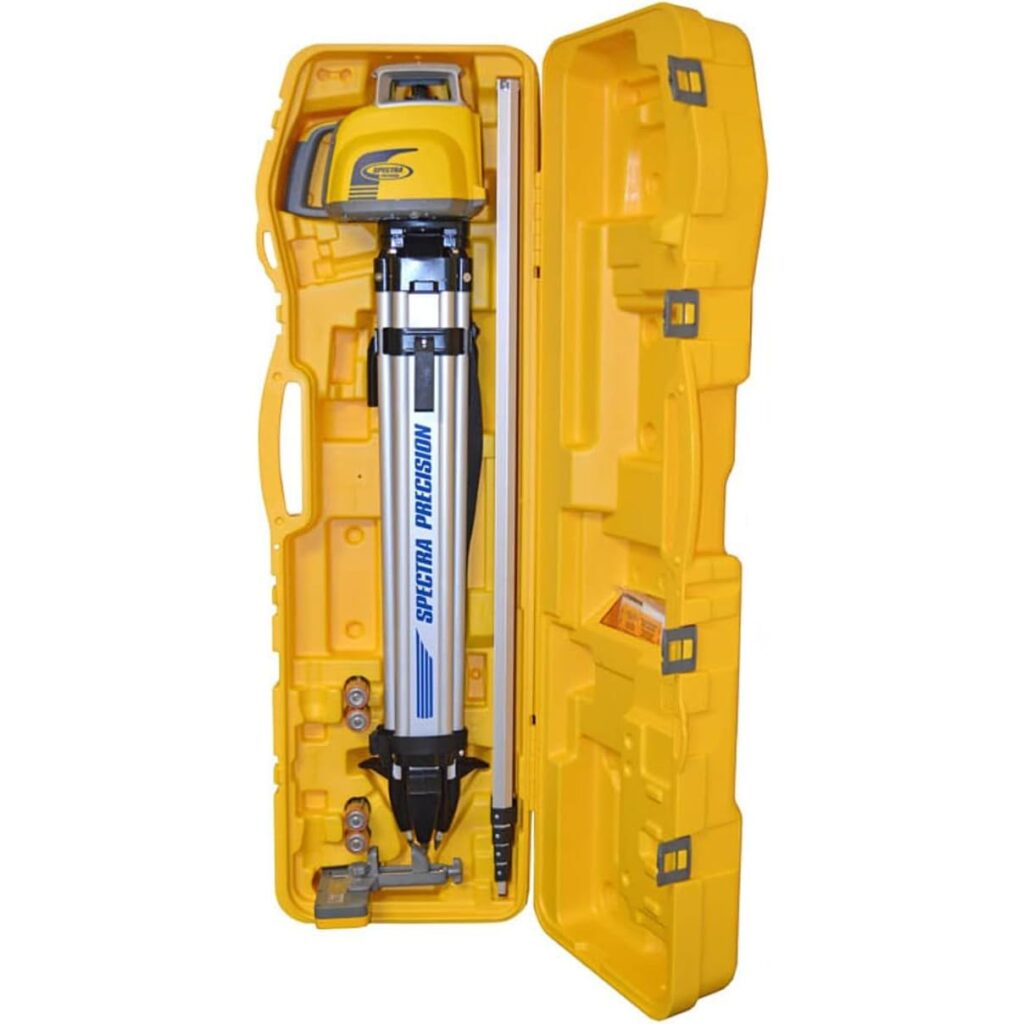
The Spectra Precision LL300N Laser Level is a reliable choice for construction work. Its outstanding durability and accuracy for various tasks, along with its rugged design that withstands harsh conditions and drops, provide a sense of security in your work.
Pros
- Excellent self-leveling features saves time and effort.
- Rugged design withstands harsh conditions and drops.
- With this set, you get everything you need, including a handy case for transport.
Cons
- It is heavier than some other models, which may affect portability.
- The hard case is bulky, making it less convenient for smaller jobs.
- Alkaline batteries are not rechargeable, which adds ongoing costs.
We recently tried the Spectra Precision LL300N, and this tool can withstand severe weather conditions. The self-leveling feature worked flawlessly, allowing us to set it up quickly on any site, even in tricky weather. The metal sunshade protected the laser from the elements, ensuring reliable daily performance.
Using it was straightforward, and we appreciated the included HL450 digital receiver, which enhanced visibility from a distance. This level handled drops like a champ, providing peace of mind knowing it could take a hit and still function accurately.
Though it’s heavier than other options, its ruggedness makes it worth it. The carrying case can protect a firearm—perfect for keeping everything organized on the job site. With rechargeable batteries not included, keeping a supply of replacements on hand will be essential, but the initial package gives us plenty to start with.
DEWALT Cross Line Laser Level
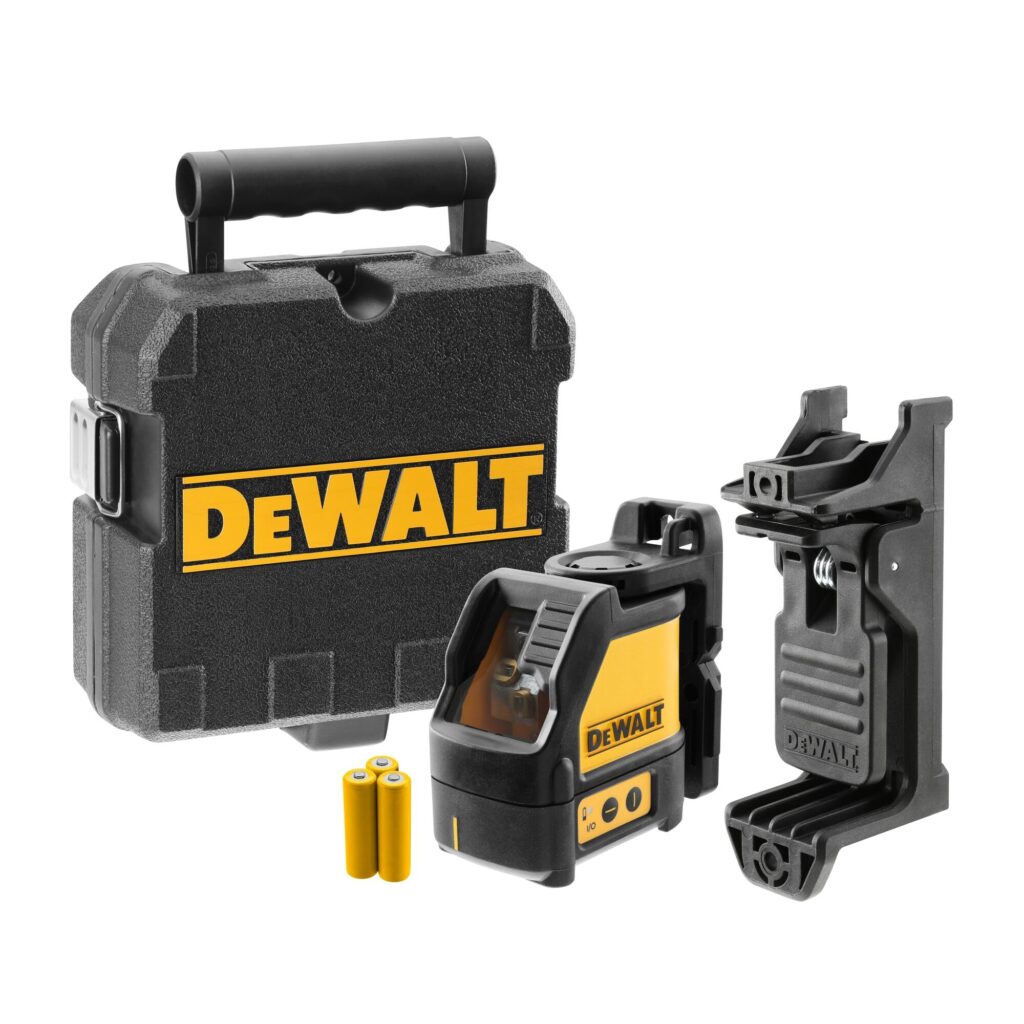
This DEWALT laser level is a solid choice for anyone looking for reliable performance on construction projects.
Pros
- Built to last through rough treatment in the work environment.
- Easy to set up and use, making it great for quick tasks.
- The laser lines are bright and crisp, allowing for precise leveling.
Cons
- It does not include a tripod, which limits some setup options.
- Magnets could be more robust for better attachment to metal surfaces.
- The range with a detector is excellent but not included in the price.
We found this DEWALT laser level easy to use right out of the box. Setting it up was a breeze, and it projected bright lines that helped us with various tasks, from hanging shelves to aligning tiles. The accuracy at about 1/8-inch over 30 feet made our work much more straightforward.
The durable design also caught our attention. Its tough casing allows it to hold up even if it takes a slight drop. Thanks to its IP54 water and debris resistance rating, using it outside or in less-than-perfect conditions was no issue.
One thing we wished for was a tripod included with the purchase. Without it, we had to find flat surfaces to set the level on. While the built-in magnets were handy, they could have been stronger. Overall, this DEWALT laser level stands out for its reliability and ease of use.
DOVOH 4×360° Laser Level
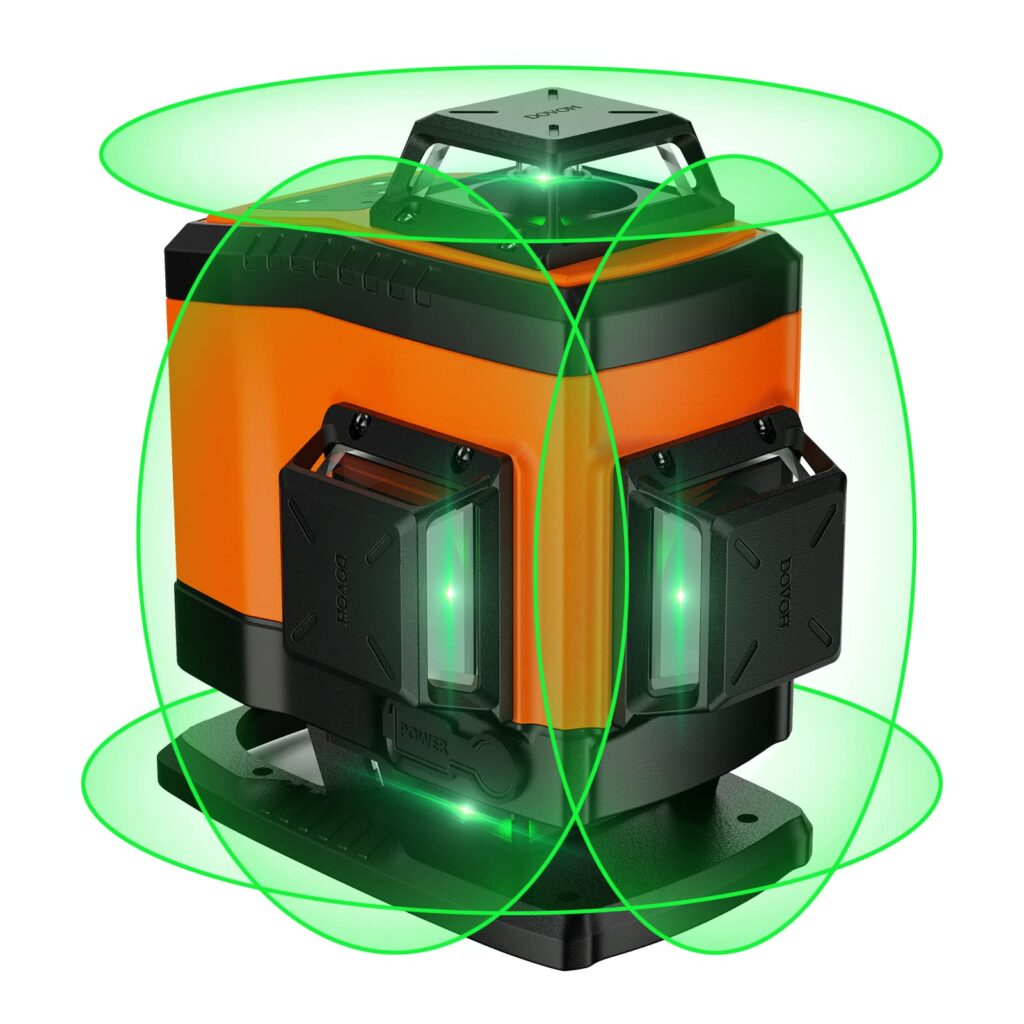
We recommend the DOVOH 4×360° Laser Level for its quality and versatility in construction tasks.
Pros
- Robust rubber housing adds durability and shock resistance.
- It comes with manual and self-leveling options to suit different needs.
- Long battery life with dual rechargeable batteries.
Cons
- It can be hard to see in bright light conditions.
- It’s bulky compared to simpler models.
- It might require adjustments for accuracy in rough environments.
We found that the DOVOH laser level is beneficial for various projects. Setting it up took no time, and the self-leveling feature was impressive. It quickly adjusts, providing precise measurements that make tiling or installing drywall much more accessible.
We used the pulse mode with a receiver in outdoor settings, effectively extending our working range. We liked how easy it was to attach the magnetic bracket to metal surfaces, making the setup smoother. However, we noticed the laser beam’s visibility can fade in bright areas.
Overall, the DOVOH 4×360° Laser Level is a solid choice for amateurs and professionals. We appreciate how it meets most of our leveling needs during construction projects, and the included accessories add extra value. If this instrument is a valuable addition to our arsenal, problems with eyesight should be manageable.
Takamine 16 Lines Green Laser Level Pro
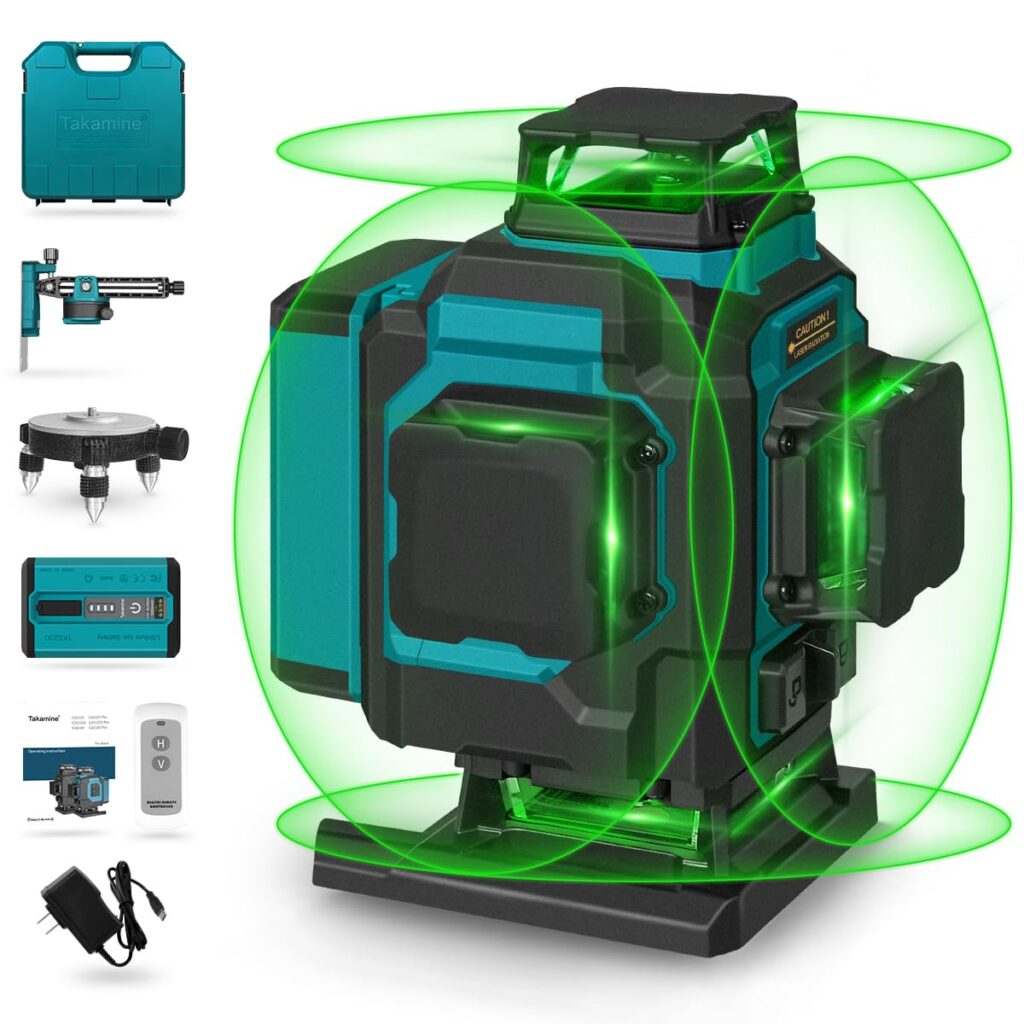
We recommend this laser level for construction due to its bright lines and user-friendly features.
Pros
- The lines of a green laser are apparent.
- Multiple installation options offer versatility.
- Excellent battery life with quick recharging.
Cons
- The user manual could be more precise.
- Limited battery replacement options.
- It’s heavy for some users.
Using the Takamine GM160 has been a great experience. The 4×360° laser makes it easy to see lines at different angles. Its green laser is brighter than the red beams we’ve used before, especially in bright settings. Working on both walls and ceilings was straightforward, thanks to the intersecting lines that create a clear visual layout.
The multiple mounting options set this level apart. We appreciate the versatility of its mounting threads and sturdy base. Using the magnetic bracket was especially handy for quick setups. It can easily attach to a tripod or be fixed directly to a wall, which adds to its usability in various situations.
Battery life has also been impressive. The Type-C charging is notably quicker than standard options. While some users mentioned concerns about battery replacement, our experience has been that it lasts well for our projects. It’s sturdy and dependable for construction work because it can endure challenging circumstances.
Buying Guide
We should consider several important features when choosing a laser levels for construction.
Accuracy And Range
- Accuracy: Look for models that provide precise measurements.
- Range: Determine clearly how far the laser projects. Please choose a range that fits our typical job site needs.
Types Of Laser Level
- Line Laser: Good for leveling and aligning.
- Rotary Laser: Best for large areas and outdoor use.
- Dot Laser: Useful for spot-checking.
Visibility
- Laser Color: Red lasers are standard, but green lasers are brighter and more visible in daylight.
- Receiver Compatibility: Ensure the level works with a receiver for outdoor visibility.
Durability
- Build Quality: A sturdy construction helps the tool withstand job site conditions.
- Water and Dust Resistance: Look for a rating (like IP54) that indicates protection against harsh environments.
Features
- Self-Leveling: Automatic leveling saves time and effort.
- Tripod Compatibility: A level that can attach easily to a tripod offers versatility.
- Battery Life: Longer battery life means less downtime during tasks.
Budget
- Prices Vary: Set a budget that balances the quality and features we need.
- Warranty: Check for a warranty to ensure We have defects covered.
Keeping these factors in mind helps us choose the right laser level for our construction projects.
By focusing on these criteria, we can confidently choose the best laser level for our construction needs.
Frequently Asked Questions
This section will address common questions regarding laser levels for construction. Key points include the top-rated models, essential features for outdoor work, and how different brands compare.
What Are The Top-Rated Laser Levels For Professional Construction Projects?
Some of the top-rated laser levels for construction include the Bosch GLL 3-80, DEWALT DW089K, and Topcon RL-H5A. These models are known for their accuracy, durability, and ease of use in various construction settings.
Which Features Are Most Important When Selecting A Laser Level For Outdoor Construction Work?
When choosing a laser level for outdoor use, we should look for features such as visibility, range, and weather resistance. A bright laser with a long-range can improve accuracy, while durable construction protects the tool from the elements.
How Do Bosch Laser Levels Compare To Dewalt For Construction Use?
Bosch and DEWALT both offer high-quality laser levels. Bosch tends to excel in laser visibility and features, while DEWALT earns praise for its long-lasting performance and exceptional battery life. Choosing between them depends on specific project needs.
What Advantages Do 360-Degree Laser Levels Offer For Construction Site Applications?
360-degree laser levels project a continuous line around the entire site. This feature allows for easier alignment and leveling in all directions, saving time and improving accuracy during layout tasks.
Are Green Laser Levels More Effective For Construction Site Visibility Than Red Lasers?
Green laser levels are often more visible than red ones, especially in bright outdoor conditions. They provide a more precise line, which helps improve precision in various lighting situations.
What Are The Benefits Of Using A Laser Level With A Tripod In Construction?
Using a laser level with a tripod enhances stability and accuracy. It allows for precise height adjustments and a more straightforward setup, especially for longer projects or when working on uneven surfaces.

